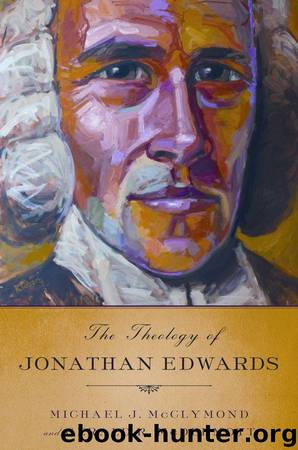The Theology of Jonathan Edwards by Michael J. McClymond & Gerald R. McDermott

Author:Michael J. McClymond & Gerald R. McDermott
Language: eng
Format: azw3, epub
Tags: null
ISBN: 9780199791606
Publisher: Oxford University Press
Published: 2011-11-18T00:00:00+00:00
Lockean Sensation
Many scholars have discussed Edwards’s debt to John Locke, whom Edwards once described as a man of “great genius.”33 Edwards was helped by Locke’s theory of personal identity in his treatise on original sin, and probably was inspired by Locke’s understandings of freedom in his treatise on the will. But the Lockean flavor of Edwards’s writings is most noticeable in Edwards’s prolific descriptions of the conversion experience. Locke believed that all knowledge was rooted in sense experience. Edwards took this philosophical principle and adapted it to his theological purposes. John E. Smith noted that Edwards appreciated Locke’s contrast between a spectator with notional understanding and a person who is so engaged as to be attracted or repulsed by something, and that Edwards pushed the point further by drawing a closer connection between sense and understanding than even Locke had proposed. In Religious Affections, Edwards wrote that the “new sensation or perception of the mind” is “what some metaphysicians call a new simple idea.” This statement was probably in reference to Locke’s “one uniform appearance or conception in the mind” that “is not distinguishable into different ideas.” Edwards’s “sense of the heart” was a “clear and distinct perception” that might be compared to an element of sense experience. Unlike sense experience, however, the “sense of the heart” was only possible through an encounter with God.34
As William Sparkes Morris noted, Edwards used Locke “mainly as a point of departure for his own thinking, rather than as a master in whose footsteps he would willingly follow.”35 He used Lockean language to explain the sense of the heart without accepting Locke’s denial of direct knowledge of any spiritual or material substance, and without approving of Locke’s disparagement of emotion and affect in religion.36 As Josh Moody explains, “Edwards’s ‘sense of the heart’ is to some extent formulated in terms of Lockean empiricism, but the source of its content is Puritan and Biblical.”37
Download
The Theology of Jonathan Edwards by Michael J. McClymond & Gerald R. McDermott.epub
This site does not store any files on its server. We only index and link to content provided by other sites. Please contact the content providers to delete copyright contents if any and email us, we'll remove relevant links or contents immediately.
The Lost Art of Listening by Michael P. Nichols(7485)
Why I Am Not A Calvinist by Dr. Peter S. Ruckman(4135)
The Rosicrucians by Christopher McIntosh(3505)
Wicca: a guide for the solitary practitioner by Scott Cunningham(3163)
Signature in the Cell: DNA and the Evidence for Intelligent Design by Stephen C. Meyer(3123)
Real Sex by Lauren F. Winner(3002)
The Holy Spirit by Billy Graham(2938)
To Light a Sacred Flame by Silver RavenWolf(2808)
The End of Faith by Sam Harris(2725)
The Gnostic Gospels by Pagels Elaine(2516)
Waking Up by Sam Harris(2448)
Nine Parts of Desire by Geraldine Brooks(2355)
Jesus by Paul Johnson(2349)
Devil, The by Almond Philip C(2323)
The God delusion by Richard Dawkins(2295)
Heavens on Earth by Michael Shermer(2270)
Kundalini by Gopi Krishna(2177)
Chosen by God by R. C. Sproul(2157)
The Nature of Consciousness by Rupert Spira(2086)
